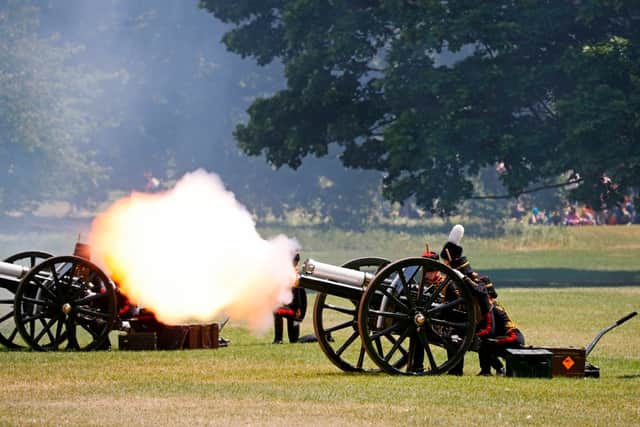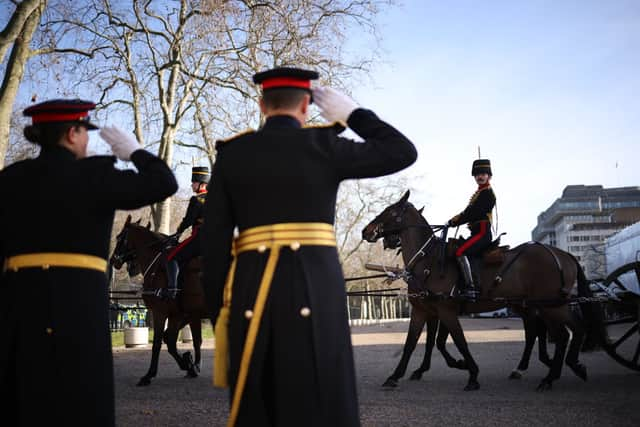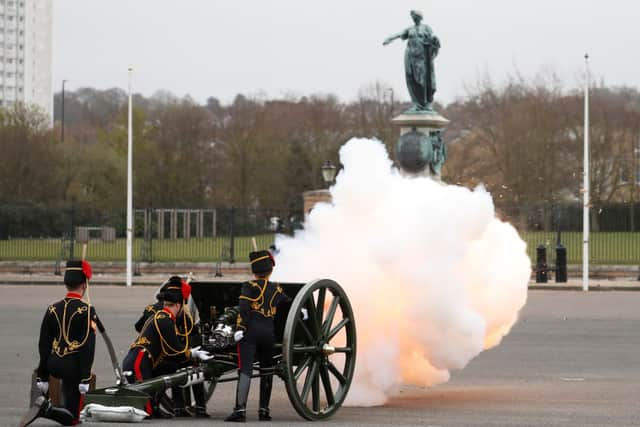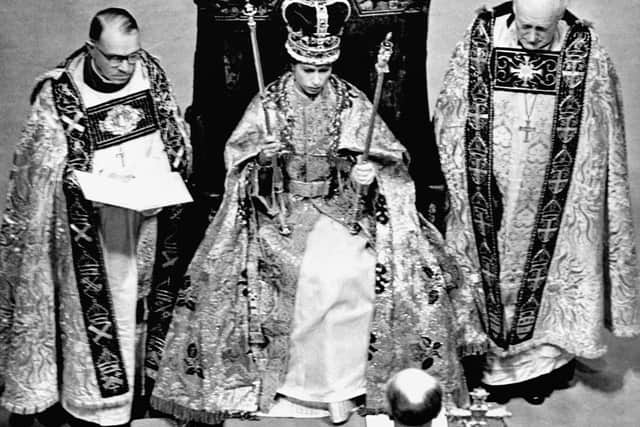What time is the Queen’s gun salute today? When is 41 gun salute for Platinum Jubilee - and meaning explained
This article contains affiliate links. We may earn a small commission on items purchased through this article, but that does not affect our editorial judgement.
and live on Freeview channel 276
Today, a traditional royal gun salute will take place to mark the Queen’s 70th anniversary in which she acceded the throne.
This is everything you need to know.
What is a gun salute?
For the royal family, special days such as anniversaries and birthdays are marked with a royal salute, which can take place across a variety of locations in London and the UK.
Advertisement
Hide AdAdvertisement
Hide AdIn London, salutes are fired from the Tower of London, and also either in Hyde Park or Green Park, depending on the occasion that it is marking.
The basic salute features 21 rounds, fired at 10 second intervals - however, in Hyde Park and Green Park, an extra 20 rounds are fired because they are both a Royal Park.


The Royal Family website states: “Teams of horses gallop across the park, pulling six thirteen-pounder guns at speed over the grass.
“The guns are quickly detached and, upon command, fire booming blanks which reverberate through the ground, sending a puff of white smoke into the air.”
When is the Queen’s gun salute?
Advertisement
Hide AdAdvertisement
Hide AdWhile the Queen’s Accession Day was actually on 6 February, which was Sunday this year, tradition states that when a special date falls on a Sunday, the Royal salute will not be fired until the following day.
That means that the gun salute will take place today instead, on Monday 7 February.
The Green Park will host The King’s Troop Royal House Artillery to fire a 41 Gun salute at 12 noon today.


Celebratory music will be performed by the Band of the Grenadier Guards near the firing position in The Green Park.
Advertisement
Hide AdAdvertisement
Hide AdFor those attending the Gun salute, ear defenders are recommended as the gun fire is extremely loud. It’s also recommended that those who are out walking their dogs in the area avoid being near the Green Park at the time of the salute, to prevent animals from being startled.
The salute at the Tower of London is fired from four 25 pounder guns which are located on Tower Wharf facing the River Thames, by the Honourable Artillery Company at 1pm.
What other dates are the gun salutes fired?
Gun salutes are fired to mark a number of different occasions, including:


- Accession Day, 6 February
- The Queen’s birthday, 21 April
- Coronation Day, 2 June
- The Queen’s official birthday, which is a Saturday in June determined nearer the time
- The Prince of Wales’s birthday, 14 November
- The State Opening of Parliament, which is usually in November or December
- Prorogation of Parliament
- Royal births, such as Prince George and Princess Charlotte
- Meeting of a visiting Head of State and the Sovereign in London, Windsor or Edinburgh
How is the Queen’s Accession Day different to her Coronation Day?
The Accession Day is different to the Coronation Day as tradition dictates that a new monarch accedes to the throne straight away when the time comes - for the Queen, this came after the death of her father on 6 February 1952.
Advertisement
Hide AdAdvertisement
Hide AdPrincess Elizabeth had been the eldest of King George VI’s daughters, and was next in line to the throne following his death.


The Queen had been in Kenya during this time, and subsequently became the first British Sovereign to accede while abroad in over 200 years.
While the Queen’s accession to the throne occurred in February 1952, her Coronation did not take place for a while yet, on 2 June 1953 in Westminster Abbey.
The Royal Family explains: “The Coronation of the new Sovereign follows some months after his or her accession, following a period of mourning and as a result of the enormous amount of preparation required to organise the ceremony.”
Advertisement
Hide AdAdvertisement
Hide AdA message from the editor: Thank you for reading. NationalWorld is a new national news brand, produced by a team of journalists, editors, video producers and designers who live and work across the UK. Find out more about who’s who in the team, and our editorial values. We want to start a community among our readers, so please follow us on Facebook, Twitter and Instagram, and keep the conversation going. You can also sign up to our newsletters and get a curated selection of our best reads to your inbox every day.
Comment Guidelines
National World encourages reader discussion on our stories. User feedback, insights and back-and-forth exchanges add a rich layer of context to reporting. Please review our Community Guidelines before commenting.
